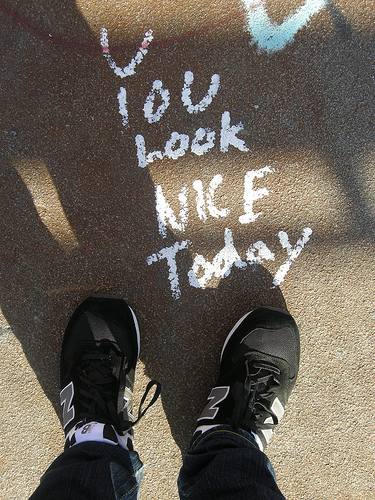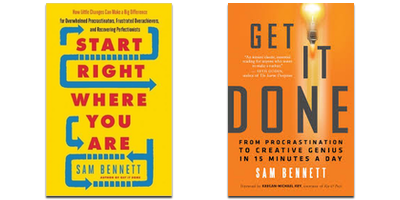
People are saying nice things to you all the time.
But I’m guessing you let most of them slide right past you. And some of you even deflect them (“Oh, no, it’s not that great…”) or immediately turn them around (“No, no, YOU are the genius…”)
I’d like you to consider the possibility that you’re being a little rude whenever you refuse a compliment.
First of all, the person is stating a truth. It may not be true for you, but it’s true for them. If they think your story is the best one they’ve ever read or that your church solo moved them or that you look nice in that sweater, that’s their business, and they get to be right.
So acknowledge that they are right. And don’t go around inflicting your opinion on them.
Just because you know you were a bit flat on the last chorus or that this sweater isn’t quite what it used to be doesn’t mean you need to tell them all about it.
Retain your empathy: remember the last time someone did that to you? You tried to say something nice and the person just wafted it away? Felt kind of icky, huh?
Here’s the other reason to take compliments seriously: they offer you valuable market research.
If someone says they find you fun or thought-provoking or nice or smart as a whip or inspiring, then use that language in your next brochure/email/elevator speech.
Imagine you’re at a holiday punch bowl standing next to someone you’d really like to impress and they ask you the oft-dreaded question, “So, what do you do?”
You may answer, “How kind of you to ask.
I’m a singer. I sing at weddings and other church events, and I also sing with a group that visits retirement communities. Someone recently said my work was ‘uplifting’ – which made me feel great, because that’s really what I want to do – lift people’s spirits.”
Nice, huh? You not only described your work but also conveyed the flavor and tone of your work and some of the truth about who you are.
It’s not bragging if it’s true.
P.S. This same strategy applies to criticism. If someone says your work is overwrought or shallow or kinda pitchy, dawg, then thank them for sharing their thoughts with you and DO NOT argue with them. Yes, your ego will flare up a bit. So go punch a pillow. But then remember to incorporate the information into your spiel.
So your next email might say something like, “I’m teaching a new class that teaches sign language to 9-18 month-old children. Some people might find this work superfluous or overly precious, but research shows that offering young children additional means of communication increases SAT scores by over 30%.”
(I completely made up that last part, by the way.)
See how acknowledging the truth clarifies your message?
Keep a running list of all the compliments you get and see what the trends are. Use those words to communicate the truth of you.
Here’s a compliment to start your list: you are good and brave.
photo credit: DG Jones via photopin cc
I notice that you being hard on yourself doesn’t help you get more done. You criticizing yourself doesn’t help you learn and grow. You dwelling on your perceived failures, shortcomings, faults, weaknesses and screw-ups doesn’t help you be a creative person.
In fact, it makes everything worse.
Being hard on yourself depletes your energy.
Being hard on yourself discourages you from taking action.
Being hard on yourself makes every idea an opportunity for punishment. (“Why didn’t you think of that sooner?” “You should have done that already!” “What’s this – another idea that you won’t finish?”)
Treating yourself as though you are some unreliable and troublesome child who must be constantly watched (“Heaven knows WHAT she’ll do if we take our eyes off her for even just one second”) is completely counter-productive.
I might also point out that you being hard on other people (criticizing, dwelling on their perceived failures, shortcomings, faults, weaknesses and screw-ups doesn’t help anything either. In fact, it makes things worse.
So just for today, be tender with yourself.
Give yourself a sincere compliment and don’t then immediately talk yourself out of it.
Look around your life and notice all the parts of it that are truly, truly wonderful.
Being gentle with yourself and others is not a cop-out: rather, it is the only way out of the destructive spirals of procrastination, perfectionism and self-loathing.
In Praise Of Those
Last Ten (…Or Twenty…) Pounds
Oh, you ten (…or
twenty…) pounds…
You remind me:
I am not a teenager
anymore
(Thank God)
My life is not lived
just for me alone anymore
(Thank God)
I’ve got good food and
good wine and good appetite
Thank God.
You jiggle a bit.
It’s not a bloat; it’s a
blessing.
Softer.
Stronger.
You have lived through
the unthinkable.
Those friends who have
gone –
The love and grief for
them that remains –
Is that part of the ten
pounds?
The jobs well done that
no one praised –
Is that a pound or two?
And those ice-sharp playground
taunts, those adolescent bone-aches,
That twenty-something
battle for Self – ferocious –
Where is the weight of
that?
Jealousy does not become
us.
Ten pounds hardly seems
like a distinction worth making when
One body is so much like
Another.
Feet Leg Belly Back Arms
Head Hands
Not all of us have every
part and
There might be an organ
that’s not quite working right or
A hormone that’s out of
whack
We’ve all been a little
Damaged in transit.
But here we are.
Here to criticize
ourselves
Here to be a better
example to our daughters and our sons
Here to shove the
photo-shopped images out of the way and say
This is what the Body of
a Person looks like.
This is the truth of me.
All of me.
Only me.
And remember, if twenty
years from now you would find a photograph of you taken today you’d think, “Wow
– I had no idea how beautiful I was.”
So let’s put on the
bathing suit and go swimming.
Let’s invite our lover’s
hand to caress our belly.
And let’s put on lovely
clothes that fit and
Give away those
not-our-size-now clothes
Because believe me, one
of your
Brothers or Sisters (who
do not enjoy the luxury of excess) could really
Use those and Lord knows
they’re not doing you any good
Just cluttering up the
closet
Torturing you.
So we stand naked and
say,
“Thank you, Body, for
loving me so well and so long.”
Offering a blessing on
This Body
Whose
Shadow
Leaves an
Imprint
On the
Air
We Breathe.
© 2010 Samantha Bennett
By The Way, You Look
Really Great Today
www.TheOrganizedArtistCompany.com
Creative people get called selfish more than almost anyone else I know. But I have a secret: I believe that a person calls an artist “selfish” because that person is mad that the artist won’t do something that the person wants them to do.
For example:
Billy is feeling uncertain and lonely and wants Sally’s attention. Sally’s mind is on other things, like maybe her novel or her gallery opening or her rehearsal. Billy gets a little peeved, and then maybe he gets angry and then he accuses Sally of being selfish. Billy calls Sally “selfish” because Sally is not doing what Billy wants Sally to do.
And in just such a way, artists are muffled.
(Sometimes you’ll hear some condescending theories about why there are so few great female artists in history. I maintain that there have been countless great female artists throughout history, but most of them never got a chance to do their work because the minute someone called them “selfish” they caved.)
So, people might call you selfish when you are not fulfilling their desires. Even if it’s a desire for you; a desire they are having on your behalf. In other words, a parent who’s concerned about their child “wasting” their education on a career in the arts might call that child “selfish.”
I would guess that there is some part of you that really, truly wants to fulfill other people’s desires.
Particularly the desires of your family and loved ones. And fulfilling other people’s desires is a fine activity, especially when you can do so with a full and generous spirit.
And there’s probably some part of you that couldn’t care two figs about what everyone else desires for you. That’s good – let’s cultivate that part a little bit. Not constantly, of course. Constantly putting your own desires ahead of everyone else’s really is selfish. If you’re in the habit of doing that, you should cut it out.
People love to call artists “selfish” because art is self-expression. Art is perhaps the ultimate self-expression. By definition, it has absolutely nothing to do with what other people want.
So by reading this blog, by committing to your art, by trying some of the exercises and opening yourself to some new ways of thinking about the work you love, you are being selfish: in the very best, highest possible meaning of that word.
And if the idea of being selfish freaks you out, think of it this way: time spent on your art makes you a better, happier, more fulfilled, more interesting person. And giving the gift of you as happy, interesting person to your family and friends is the very opposite of selfish.
Plus, we haven’t even gotten to the part about how much the art you create will help the world.
Have you been called “selfish”? Do you worry that you might be perceived as selfish? How do you handle that?


